On May 23, 2021, the China Financial Policy Report 2021 is officially released at the 2021 Tsinghua PBCSF Global Finance Forum. The policy practices are reviewed, and the financial outlook and development trends during the 14th Five-Year Plan period are prospected. Well-known scholars and industry experts are invited to participate.
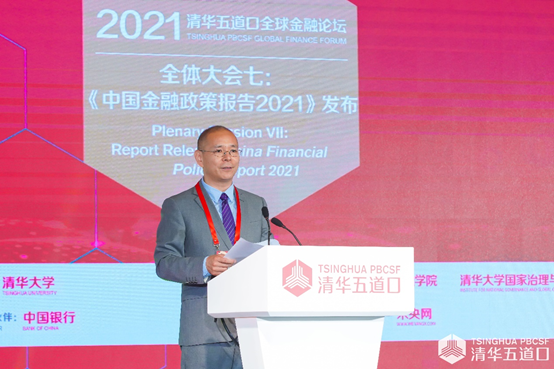
Adhering to the principle of "communicating China’s financial policies with the world", the China Financial Policy Report 2021 was jointly prepared by the National Institute of Financial Research of Tsinghua University and the Institute of Financial Policy of the Chinese Academy of Social Sciences, aiming to comprehensively and accurately reflect the major themes and policy developments in China's financial policy. Lu Lei, deputy director of the State Administration of Foreign Exchange, member of the Party Group, and member of the Strategic Advisory Committee of PBCSF, Tsinghua University, introduced the main contents of the report at the meeting. Hong Lei, Chairman of the China Futures Association, and Zhang Haiyun, Director of the Financial Market Research Center of the University of International Business and Economics commented on the report and gave a keynote speech. The release was hosted by He Haifeng, Director of the Institute of Financial Policy of the Chinese Academy of Social Sciences.
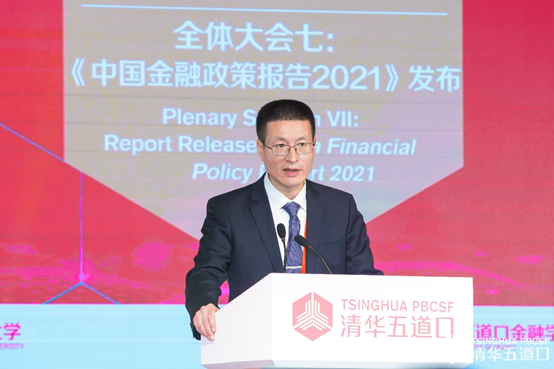
Connecting the past and the future: changes and policy responses from 2020 to 2021
The China Financial Policy Report 2021 pointed out that timely and effective assistance to respond to the pandemic is the highlight of the financial policy in 2020. In 2021, China introduced proactive financial policies to directly support the financing needs of epidemic prevention and control, and provide a consistent environment for steady growth of real economy by strengthening countercyclical financial regulation. Meanwhile, China has actively promoted the capital market reform, manage systemic risks in a steady and orderly manner, and strengthen the risk prevention capabilities of financial institutions. Major missions for financial reform and development during the 13th Five-Year Plan has been successfully achieved, laying a solid foundation for the new journey of the 14th Five-Year Plan. The report emphasizes that the global pandemic is still the main uncertainty that the current financial system faces. Lu Lei put forward three noteworthy phenomena. First, on aggregate level, China’s economy has shown an early recovery and stable trend. Second, from the perspective of structural characteristics, although the world economy is recovering, there is a trend of divergence. Third, from the perspective of monetary policy, global liquidity remains abundant, and inflation expectations are clearly rising.
Keeping the right and innovating in the changing world: from the financial achievements of the 13th Five-Year Plan to the outlook of the 14th Five-Year Plan
The China Financial Policy Report 2021 pointed out that the financial reform and development during the 13th Five-Year Plan period have remarkable achievements, and the financial services for the real economy and its own resilience have been significantly improved. On the one hand, financial system has successfully assisted in the high-quality development of real economy and has made groundbreaking historical achievements. On the other hand, financial reform has made significant progress in promoting marketization, rule of law, and internationalization. Promoting high-quality development with new development concepts is the main theme of financial reform in the 14th Five-Year Plan. Lu Lei pointed out that we should understand the direction and roadmap of the high-quality development of the financial industry in five aspects: building a modern financial governance system, promoting operational quality of financial institutions to support real economy, accelerating the establishment of a modern financial system, maintaining the bottom line of preventing systemic financial risks, developing financial technology actively and prudentially. Lu Lei emphasized that we must grasp two priorities: developing green finance and striving to improve the financial system that supports innovation.
After the release of the China Financial Policy Report 2021, Hong Lei and Zhang Haiyun successively delivered speeches.
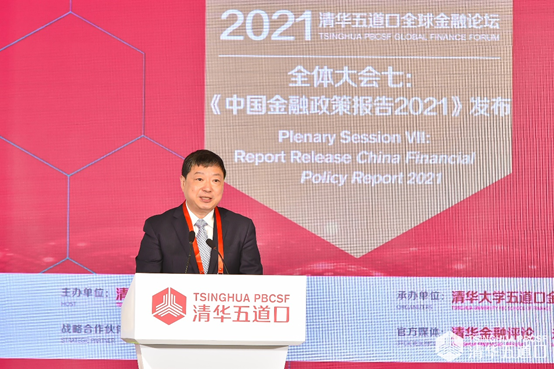
Develop commodity OTC market and enhance the futures industry's capability to serve the real economy
Hong Lei pointed out that it is necessary to implement the new development concept, develop the futures and derivatives market, and put forward several thoughts in conjunction with the development of the futures market. First, China's futures market has ushered in a period of important opportunities for rapid development. The variety of products continues to improve, the pricing quality and influence of the futures market continue to increase, and the risk management function of the futures market is recognized by more and more entities. Second, we should vigorously cultivate and develop a group of commodity over-the-counter dealers to meet the needs of individualized risk management of entity enterprises, and strengthen the pricing power and price influence of futures market. Third, we should strengthen the cultural construction of "fiduciary obligations" in the futures industry. Fourth, give full play to the functions of the Association and promote the innovative development of the industry. Hong Lei pointed out that this year the Association will focus on improving the pricing capabilities of futures operating institutions and enhancing core competitiveness, strengthening professional training and talent team building, and strengthening the construction of an industry culture guided by fiduciary duty.
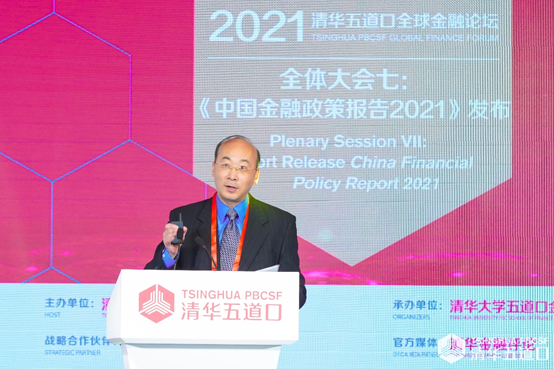
The "Tao" of Finance: Enlightenment from China's Philosophy
Zhang Haiyun elaborated on six aspects to shed light on the “Tao” of finance: the “Tao” of physics to the “Tao” of finance, the difficulties of global economy and finance, the encounter between ancient Chinese wisdom and contemporary finance, the dilemma of financial crisis, the paradox of financial stability, and the paradox of financial risks.
Zhang Haiyun pointed out that Chinese traditional philosophy can bring some new perspectives to modern financial concepts such as financial crisis, financial stability, and financial risks. Zhang Haiyun mentioned that policies that focus too much on short-term financial stability are likely to erode long-term financial soundness, thus endanger long-term financial stability. Relying on monetary easing and regulatory intervention to reduce short-term financial risks is likely to weaken long-term financial resilience and then increase long-term financial risks, which is referred as the "financial risk paradox." Therefore, efforts to maintain current financial stability must be carefully considered in terms of methods and strength.
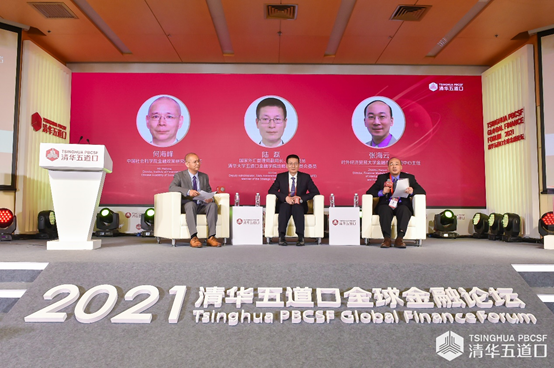
In the roundtable discussion session, He Haifeng and the two guests discussed and exchanged views on macro-financial control policies, the establishment of a modern financial system, and the inspiring thinking of ancient philosophies. Zhang Haiyun, Director of the Financial Market Research Center of the University of International Business and Economics, pointed out that the paradox of financial stability needs to be studied in depth. Regarding the paradox of financial risks, ancient Chinese philosophy also proposed that it needs to be considered from the perspective of financial resilience. This perspective has gradually attracted some attention after the global financial crisis, but still needs more research and discussion.
Lu Lei, deputy Director of the State Administration of Foreign Exchange and member of the Party Leadership Group, and member of the Strategic Advisory Committee of PBCSF, Tsinghua University, said that macro-financial regulation policies require overall and holistic thinking. Specifically, it includes three aspects: the first is to coordinate fiscal and monetary policies; the second is to coordinate domestic and foreign economic policies; the third is to consider both macro-control fiscal policies and macro-prudential policies. Lu Lei also talked about three perspectives for the development of the financial system. First, build a more well-functioning financial infrastructure. Credit information, registration, settlement, and clearing can operate more efficiently and at low cost in the future and become efficient public goods. Second, finance should always serve the real economy. High-quality development should be based on technological innovation, and financial technology has huge development potential in the future. Finally, green finance is the key to the future financial development in pursuit of building a community with a shared future for mankind.